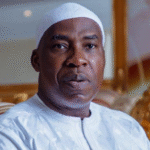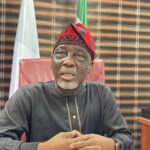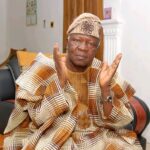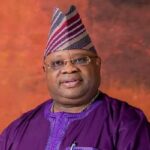Now Reading: Mathematics: New admission policy stirs controversy as Varsity lecturers, students take positions
-
01
Mathematics: New admission policy stirs controversy as Varsity lecturers, students take positions

Mathematics: New admission policy stirs controversy as Varsity lecturers, students take positions
The Federal Government’s decision to remove Mathematics as a mandatory admission requirement for arts and humanities students has stirred conversations across Nigeria’s academic circles.
For decades, Mathematics and English have been the two immovable pillars of admission into Nigerian universities.
However, the Federal Ministry of Education, in a statement by its spokesperson, Folasade Boriowo, on Tuesday, said senior secondary school students in the arts and humanities will no longer be required to present a credit in mathematics in their Senior School Certificate Examination, SSCE, for tertiary admissions.
While the reform aims to make tertiary education more inclusive, lecturers are divided on whether it strengthens or weakens academic standards.
Removing Mathematics requirement is a mistake – Dr. Ashir T Inuwa
A lecturer in the Department of Mass Communication at Bayero University, Kano, Dr. Ashir Tukur Inuwa, in an exclusive interview with DAILY POST on Wednesday faulted the Federal Government’s decision to exclude Mathematics as a compulsory subject for admission into arts and humanities programmes.
He said the policy could worsen students’ poor attitude toward the subject and discourage them from making efforts to learn basic mathematical concepts.
“To be honest, it is not right. Before now, we all knew that art students were quietly admitted even when Mathematics wasn’t emphasized. But for the government to officially announce that Mathematics is no longer required is a problem.”
He explained that the decision could lead to complacency among secondary school students who already struggle with “maths phobia.”
“Once they know they don’t need it for admission, most of them won’t even pay attention in class. The truth is, Mathematics is not as hard as they think; they only find it difficult because of fear.”
Dr. Inuwa added that Mathematics remains an essential life skill that should not be discarded in any field of study.
“Mathematics is very important in our lives whether you are in the sciences or the arts. It shouldn’t be removed from the list of compulsory subjects.”
Students may regret skipping mathematics later in life – Ibrahim Shittu
A lecturer at Ahmadu Bello University (ABU), Zaria, Mr. Ibrahim Shittu, has expressed concern over the Federal Government’s new admission policy, warning that the decision to exclude Mathematics for arts and humanities students could have long-term consequences.
“The funny part is that after graduating, these students are very likely to engage in jobs that require some level of computational competence,” Mr. Shittu said.
“By then, they’ll realise they’ve been cheated by not being allowed to take the subject seriously at some point in their life.”
He added that the reform might also create inconsistencies for courses like Economics, which often attract arts students but still rely heavily on mathematical understanding.
“Courses like Economics that are largely applied for by art students would find it difficult to accommodate this compromise in entry requirements,” he noted.
Mr. Shittu advised students not to see the policy as an easy escape but to think critically about its implications.
“Students should be wise to know that not all government policies that seem to be in their favour are actually beneficial to them,” he said.
“At a time when the global landscape of education is transcending disciplines, we’re underplaying critical subjects that open the mind, boost imagination, and advance problem-solving skills.”
“Prospective freshers need to be guided not to fall for the policy,” Mr. Shittu cautioned.
Removing maths from Arts is like treating headache by cutting off the head – Dr. Lawanti
Dr. Kabiru Danladi Lawanti, a senior lecturer in the Department of Mass Communication at Ahmadu Bello University, Zaria, said the decision quietly erodes something far more precious than numbers; our ability to think.
Recalling his own experience as a student, Lawanti said his earliest encounter with Mathematics was enjoyable because his teacher in Junior Secondary School made the subject engaging and relatable.
“I remember my first encounter with numbers. It was interesting because our Mathematics teacher in JSS Akko made the subject come alive. He was patient, imaginative, and deeply human. He showed us that Mathematics was not just about numbers but about patterns, relationships, and reasoning,” he said.
However, he noted that things changed when he reached senior secondary school.
“By the time we moved to Senior Secondary School, the story changed. With poor teaching and growing fear, Mathematics became a nightmare. We ran from the subject, skipped classes, and hated the teacher by implication, we hated the subject,” he recalled.
Lawanti said this memory resurfaced when he heard about the new policy. While many students may celebrate the reform, he cautioned that it could have dangerous long-term implications.
“Many students will rejoice. But I am worried because this decision quietly erodes something far more precious than numbers — our ability to think.”
He argued that Mathematics goes beyond arithmetic or equations.
“Mathematics is not about finding x or y. It is about how to think. It is the discipline of logic, the grammar of reasoning, and the architecture of problem-solving,” he explained.
“When we remove it from the educational foundation of the arts and humanities, we are not making life easier for students, we are simply making their minds weaker.”
The lecturer stressed that every field from arts to law is rooted in mathematical thinking, whether expressed in numbers or patterns.
“The artist balancing symmetry in a painting, the poet weaving rhythm into verse, the musician composing harmony, the lawyer building logical arguments, the historian discerning patterns- all of them are using Mathematics in thought, if not in symbol,” he said.
“The ability to reason systematically, to detect patterns, to separate emotion from evidence, is Mathematics at work.”
According to Lawanti, Mathematics rightly taught is not a wall but a window that helps students move from intuition to structured reasoning.
“It disciplines creativity without killing it. A well-trained artist who understands proportion, sequence, and logic creates more compelling art. A philosopher who reasons like a mathematician writes clearer arguments. A journalist who thinks sharply writes accurate reports with facts,” he added.
He lamented that Nigeria’s education system has misunderstood this truth for years due to inconsistent and imported policies that fail to consider local realities.
“Our education policies are often shaped by where policymakers studied; some in the UK, others in the US or Asia and they return preaching ‘international best practices’ that ignore our cultural and educational context,” he said.
Lawanti faulted the government’s approach to fixing the problem of poor performance in Mathematics by eliminating it instead of improving how it is taught.
“Now, instead of fixing how we teach Mathematics, we are simply abandoning it. This is like treating a headache by cutting off the head,” he said.
“The problem was never that arts and humanities students don’t need Mathematics; it is that they were never shown why they need it.”
He argued that removing Mathematics from the humanities divides knowledge and weakens intellectual growth.
“It reinforces the false dichotomy between those who think and those who feel. But human progress depends on the marriage of both. The great thinkers of history from Leonardo da Vinci to Chinua Achebe combined precision with imagination, structure with story.”
Lawanti added that mathematical reasoning builds both intellectual and moral virtues; honesty, patience, and humility before evidence which are essential for good governance and civic responsibility.
“A society that cannot reason clearly cannot govern wisely. The corruption, impulsive policymaking, and shallow debate that dominate our public life are symptoms of a deeper deficit, the inability to think in structured, evidence-based ways.”
He concluded that rather than removing Mathematics, Nigeria should reform how it is taught to make it more imaginative and relevant to real life.
“Teach Mathematics not as punishment but as perspective. Teach it as a way to organise thought, to interpret information, and to connect ideas.”
“The removal of Mathematics as a compulsory subject may appear like a relief, but it is, in truth, a retreat from rigour. No nation can grow by producing graduates who can feel deeply but think shallowly. The goal should not be to make Mathematics optional, but to make it meaningful.”
Meanwhile, there is ongoing jubilation among students and young people who believe the subject is not needed in the field of arts and humanity.
Aliu Ibrahim said it’s unnecessary to include Mathematics for admission into arts and humanity courses. According to him, “ How do we apply Maths in our field? Basic counting knowledge is what we need as students of humanity and arts. The rest is waste of time,” he said.
Source: Daily Post















